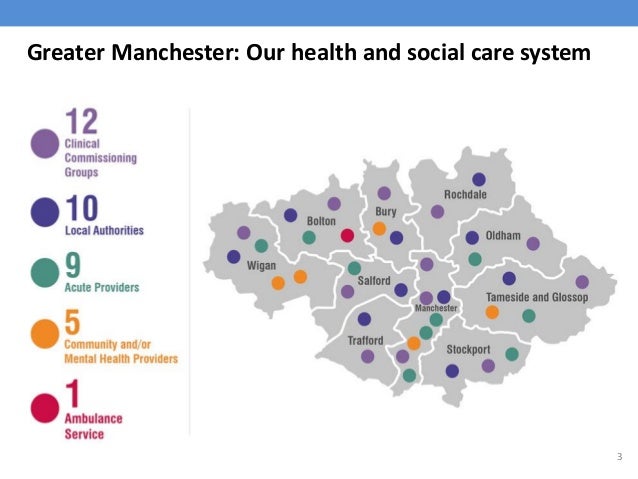The announcement in February 2015 that local councils in Greater Manchester would be given a say in the management of the NHS in the conurbation generated a lot of publicity. This is an attempt to make sense of what has happened since.
The announced devolution of powers in relation to the NHS doesn’t amount to very much. All the laws, regulations and structures which apply in the rest of England still apply in Manchester. That is not the case in Wales, Scotland or Northern Ireland. This is more like delegation than devolution.

A Memorandum of Understanding was agreed by NHS England, 12 NHS Clinical Commissioning Groups, 15 NHS providers and 10 local authorities. It establishes a health and social care partnership board which manages the £6 billion annual budget and a £450million transformation fund. This gives local councils a formal role in the management of health care – something they have not had since 1974. The board are developing a common technology strategy, which is intended to to enable the sharing of patient records between different organisations. They have also agreed a common approach to public health – something which councils have been responsible for since 2012.
A strategic plan has been agreed in each borough, and these are developing independently. There will be some concentration of specialities into fewer centres, so, for example, it is proposed to establish four centres for elective orthopaedic surgery, and three centres for emergency surgery so these will not be provided in every borough. This concentration will require considerable capital investment and it is not clear where that will come from.
The intention is to integrate health and social care, and establish what are called local care organisations. These involve bringing adult social care staff into NHS organisations. This happened in Salford some time ago, and is developing in other boroughs. Social care is still meanstested. It is difficult to see what this means in practice. Given that the councils’ budgets have been reduced substantially it seems likely that NHS funds will be used to support social care, as it is much cheaper for trusts to move people into residential care, or pay for equipment than to keep patients in hospital. It has certainly meant that social care staff are under a lot of pressure to get services organised if they are needed to get people out of hospital.
In Manchester City itself involving local councillors has generated some radical changes. Three hospitals, currently run by three different NHS trusts, are in the process of amalgamating into a single organisation. The three Clinical Commissioning Groups have merged into one and are to move into the City Council. A tender has just been announced to run all health and social care services outside hospital. Over ten years this would amount to £6 billion. The hospital consortium is an obvious bidder. At the time of writing it is not clear if there will be any other bidders. This local care organisation would run social care and manage the contracts of voluntary organisations. According to the commissioners it will… “not only improve health outcomes and support people to live independent lives, but also gives us a way of addressing some of the financial pressures we face. “
It remains to be seen whether this approach will give better results than those taken in the rest of England.
This is a personal view. It first appeared in The Pensioner.
